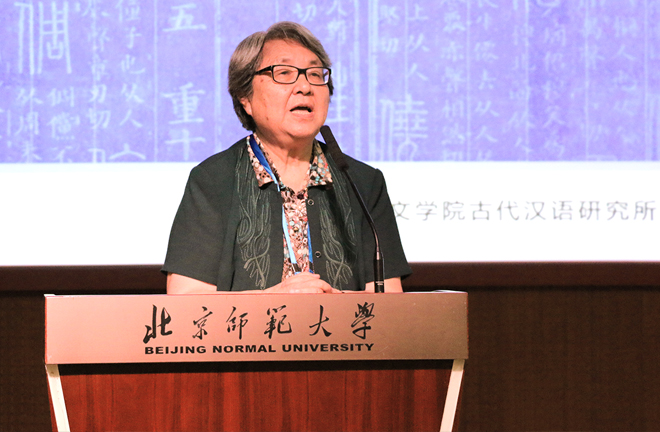Strengthening cultural confidence in study of Chinese characters

Wang Ning, a senior professor at BNU, introduced the Digital Research Platform of Shuo Wen Jie Zi at the launch ceremony. Photo: Chen Jia/Academy Press
This year marks the 150th anniversary of the birth of Zhang Taiyan (1869–1936), a democratic revolutionary, thinker and master of Chinese culture. Beijing Normal University held the publishing ceremony of Cognates in Shuo Wen Jie Zi and launched the Digital Research Platform of Shuo Wen Jie Zi on Aug. 29–30 to discuss in depth the contribution of Zhang to the traditional study of Chinese characters and to commemorate his birthday. Shuo Wen Jie Zi was written by Xu Shen (c. 58–c. 147) and literally means “interpretation of texts and characters.” It was the first book to systematically analyze different forms and cognates of Chinese characters. There have been many scholars of different dynasties dedicated to the study of Shuo Wen Jie Zi.
Lu Zongda is the most important inheritor of Huang Kan (1886–1935) and Zhang Taiyan’s study of Chinese characters, the studies of Shuo Wen Jie Zi in particular. Cognates in Shuo Wen Jie Zi is one of his most important works, which seeks to further develop the content of Zhang and Huang’s work. Meng Bai, director of the Academy Press, said that China has experienced great changes over the past century, and the survival and development of Chinese cultural traditions is a huge issue for the future. To this end, scholars need to make relentless efforts and constant progress in their academic careers. At the same time, the task of our publishers is to enable younger generations to see and experience these treasures.
Meng added that the press finally adopted the photocopying of manuscripts, in order to allow readers to understand the methods of thinking and trajectories of research in a more direct way.
Wang Ning, a senior professor at BNU, said that Shuo Wen Jie Zi is the most fundamental book in the traditional study of Chinese characters. The study of Shuo Wen Jie Zi, continued by generations of scholars for hundreds of years, has contributed a lot to the theoretical construction of the study of Chinese characters. The early 20th century was an era of great change in Chinese society. Before and after the Revolution of 1911, Zhang tried to seek culturally conscious ways to encourage a better sense of national self-confidence and cohesion. Among his students, Huang was Zhang’s most accomplished inheritor in his major areas of research, the study of Chinese characters. Huang developed many of Zhang’s unfinished topics of research. Huang regarded Shuo Wen Jie Zi as the top priority in the study of Chinese characters and as the foundation of Chinese cultural identity.
Since 1995, Wang Ning and her team have made several successful attempts to introduce computer technology into the study of Shuo Wen Jie Zi. On Aug. 29, the Digital Research Platform of Shuo Wen Jie Zi (http://szsw.bnu.edu.cn) was officially launched. At the launch event, Wang introduced the functions of this platform in regard to education, scientific research and social services. She added that Shuo Wen Jie Zi’s explanation of Chinese characters is the most authoritative in the education field, in basic education especially. If such interpretations of Chinese characters can be disseminated through digital technology, the science of Chinese characters will be promoted significantly. We will optimize the platform continuously according to social feedback and requirements, to better inherit and maintain traditional Chinese culture and achieve more innovative development of the ancient study of Shuo Wen Jie Zi.
Wang Lijun, a professor at BNU, said that Wang Ning’s theoretical innovation and systematic construction of exegesis and philology have enabled the two disciplines to achieve a modern transformation. The Digital Research Platform of Shuo Wen Jie Zi is not only a database, but a digital presentation of the theoretical thoughts of generations of scholars in the fields.
Chinese characters are a foundation in the inheritance of traditional Chinese culture and boon to national cohesion. As such, it is the responsibility of every Chinese to protect the Chinese language. Chinese characters are an important channel to reflect the profound nature of Chinese studies in many aspects. Lu Zongda and Wang Ning are not only direct successors of Zhang and Huang, but also BNU’s pride, said Zhou Zuoyu, vice president of BNU.
edited by YANG LANLAN
